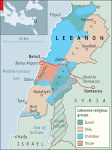Electronic Lebanon, a branch of Electronic Intifada, has been publishing some excellent reports on the situation, from a helpfully critical perspective. I strongly recommend reading Maureen Clare Murphy's piece, as well as this one by IRIN, among the others. Rami Khouri's column in today's Daily Star is also worth reading.
Robert Fisk sees parallels between the political situation in West Beirut and that in Gaza:
When Hamas became part of the Palestinian government, the West rejected it. So Hamas took over Gaza. When the Hizbollah became part of the Lebanese government, the Americans rejected it. Now Hizbollah has taken over west Beirut. The parallels are not exact, of course. Hamas won a convincing electoral victory. Hizbollah was a minority in the Lebanese government; its withdrawal from cabinet seats with other Shias was occasioned by Mr Siniora's American-defined policies and by their own electoral inability to change these. The Lebanese don't want an Islamic republic any more than the Palestinians. But when Sayed Hassan Nasrallah, the Hizbollah chairman, told a press conference that this was a "new era" for Lebanon, he meant what he said.Prime Minisiter Fouad Siniora addressed the country this afternoon, urging Hezbollah to cooperate with the government to end the crisis. In particular, he said (the translation here by Lebanon Now seems a bit choppy):
First, neither of us is non-partisan any longer, and we must agree on a neutral mediator to help us reach agreement and solution.As of this posting, Hezbollah has not yet responded.
Secondly, the arms of Hezbollah are today more than ever an issue that necessitates discussion… Hezbollah’s arms must be pointed at resisting Israel only, and with the agreement of the Lebanese and the government. Else, the only role of the arms is illegal. Hence, we must search with Hezbollah for a solution through constitutional institutions.
Third, we must amend the Lebanese democratic solution, but not through violence… So we may need a transitional formula:
1) The two decisions of the government have not yet been decreed, and will be left to the discretion of the army.
2) Withdrawing gunmen from the streets, ending the sit-in and handing security over to the national army.
3) The election of a consensus president immediately with a national-unity government in which neither party can force its beliefs.
4) The discussion of an electoral law in parliament.
5) The promise of all parties to abide by a code of media ethics that we can build with our own hands.
I could hear two or three gunshots Hamra shortly after Siniora's speech.

No comments:
Post a Comment